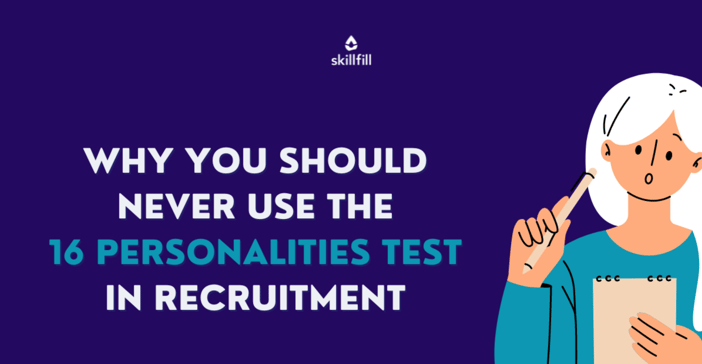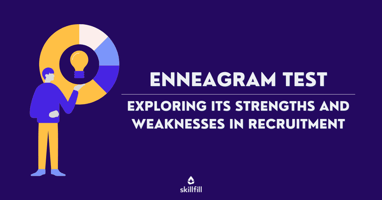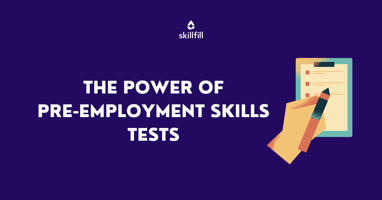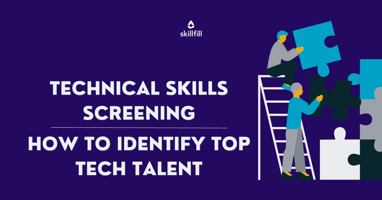In today's competitive job market, recruiters and employers face the challenge of identifying...
Why you should never use the 16 personalities test to hire top talent
It can be challenging to find the perfect candidate for a job opening.
So it is important that recruiters continually seek new ways to assess job applicants.
One tool that has gained popularity among recruiters is the 16 personalities personality test, also known as the Myers-Briggs Type Indicator (MBTI). This MBTI test is often used to identify candidates' strengths and weaknesses and determine if they're a good fit for the job. However, relying on this 16 personalities test alone is not the best approach for recruiters looking to find the right candidate for their company. This article will describe what the 16 personalities test is, what it can be used for, but also delves into the limitations and why recruiters should avoid using it to find the best candidates.
What is the 16 personalities test?
Personality tests are designed to evaluate a candidate's personality traits to help recruiters understand how they may fit within the company culture. These tests come in different forms, such as the Big Five and 16 personalities.
The 16 personalities test, also known as the Myers-Briggs Type Indicator (MBTI), is a personality assessment tool that categorises individuals into one of 16 different personalities based on their preferences in four dichotomies:
- Extraversion (E) vs. Introversion (I): How candidates direct and receive energy.
- Sensing (S) vs. Intuition (N): How candidates process information.
- Thinking (T) vs. Feeling (F): How candidates make decisions.
- Judging (J) vs. Perceiving (P): How candidates approach the outside world.
.png?width=731&height=382&name=Dimensions%20of%20the%2016%20personalities%20test%20(1).png)
By answering a series of questions, the 16 personalities test results aim to identify a person's dominant traits and tendencies, which can provide insights into their behaviour, communication style, and overall outlook on life. The 16 personalities test is widely used in hiring decisions, career counseling, team-building exercises, and personal development programs.
Although personality tests can be helpful in specific contexts, they are not an accurate personality assessment for evaluating job applicants, and it is essential to recognise its limitations.
The 16 personalities types
The 16 personality types, or also often referred to as 'archetypes', in the Myers-Briggs Type Indicator (MBTI) framework are as follows:
- ISTJ (Introverted, Sensing, Thinking, Judging): Practical, responsible, and organised individuals who value structure and tradition.
- ISFJ (Introverted, Sensing, Feeling, Judging): Compassionate, loyal, and conscientious individuals who prioritise harmony and cooperation.
- INFJ (Introverted, Intuition, Feeling, Judging): Insightful, empathetic, and visionary individuals who seek meaning and connection.
- INTJ (Introverted, Intuition, Thinking, Judging): Independent, strategic, and analytical individuals who are driven by their vision and ideas.
- ISTP (Introverted, Sensing, Thinking, Perceiving): Adaptable, analytical, and resourceful individuals who thrive in hands-on problem-solving.
- ISFP (Introverted, Sensing, Feeling, Perceiving): Creative, empathetic, and adaptable individuals who value personal expression and authenticity.
- INFP (Introverted, Intuition, Feeling, Perceiving): Idealistic, compassionate, and creative individuals who seek harmony and personal growth.
- INTP (Introverted, Intuition, Thinking, Perceiving): Curious, logical, and innovative individuals who enjoy exploring complex theories and ideas.
- ESTP (Extraverted, Sensing, Thinking, Perceiving): Energetic, adaptable, and spontaneous individuals who excel in the moment and enjoy taking risks.
- ESFP (Extraverted, Sensing, Feeling, Perceiving): Enthusiastic, spontaneous, and playful individuals who value experiences and enjoy connecting with others.
- ENFP (Extraverted, Intuition, Feeling, Perceiving): Imaginative, enthusiastic, and empathetic individuals who seek inspiration and pursue their passions.
- ENTP (Extraverted, Intuition, Thinking, Perceiving): Inventive, resourceful, and outspoken individuals who thrive on exploring new possibilities and ideas.
- ESTJ (Extraverted, Sensing, Thinking, Judging): Practical, decisive, and organised individuals who value efficiency and structure.
- ESFJ (Extraverted, Sensing, Feeling, Judging): Warm, responsible, and sociable individuals who prioritise the well-being of others and enjoy creating a sense of community.
- ENFJ (Extraverted, Intuition, Feeling, Judging): Charismatic, empathetic, and insightful individuals who are dedicated to helping others and fostering positive change.
- ENTJ (Extraverted, Intuition, Thinking, Judging): Assertive, strategic, and ambitious individuals who are natural leaders and thrive in challenging environments.
Interpretation of the 16 archetypes
The 16 archetypes are grouped into The Analysts, The Diplomats, The Sentinels and The Explorers.

The Analysts
The Analysts group consists of the INTJ, INTP, ENTJ, and ENTP personality types. These individuals are known for their strategic and logical thinking. They are often seen as innovators and problem-solvers, with a keen ability to analyze complex situations and come up with creative solutions. The Analysts are characterized by their independence, curiosity, and intellectual prowess. They are driven by a desire to understand the world around them and are often drawn to careers in science, technology, and research.
The Diplomats
The Diplomats group includes the INFJ, INFP, ENFJ, and ENFP personality types. These individuals are known for their empathy, idealism, and passion for helping others. They are often seen as compassionate and intuitive, with a strong sense of purpose and vision. The Diplomats are driven by a desire to make a positive impact on the world and are often drawn to careers in counseling, education, and the arts.
The Sentinels
The Sentinels group comprises the ISTJ, ISFJ, ESTJ, and ESFJ personality types. These individuals are known for their practicality, reliability, and dedication to duty. They are often seen as responsible and hardworking, with a strong focus on maintaining stability and tradition. The Sentinels are driven by a desire to uphold social order and are often drawn to careers in administration, healthcare, and law enforcement.
The Explorers
The Explorers group encompasses the ISTP, ISFP, ESTP, and ESFP personality types. These individuals are known for their spontaneity, adaptability, and love for new experiences. They are often seen as energetic and action-oriented, with a passion for living in the present moment. The Explorers are driven by a desire for freedom and excitement and are often drawn to careers in sports, entertainment, and entrepreneurship.
Usefulness of the 16 personalities test
The 16 personalities test can be used as a conversation starter for individuals to reflect on their strengths, weaknesses, and communication styles. In team settings, it may offer a framework for understanding diverse perspectives and fostering empathy. Additionally, some individuals find personal insights and validation in the test results, positively impacting self-awareness and self-acceptance.
Limitations of the 16 Personalities Test
Not Scientifically Valid
The validity of a personality test is the extent to which it measures what it is intended to measure. The 16 personalities test is often criticized for its limited validity as the results do not always align with actual personality traits. The test lacks empirical evidence and hasn't been proven to predict job performance or success. Additionally, it has been criticised for being based on outdated theories of personality and not accounting for cultural differences.
Limited Reliability
This point refers to the consistency of the results. One of the main reasons why recruiters should avoid using the 16 personalities test is that it's not a reliable indicator of a candidate's personality. The test results are not consistent, and individuals can get different results on different occasions. Several studies have shown that the 16 personalities test lacks reliability, and people who retake the test frequently receive different outcomes. The test also doesn't account for situational variables that can affect an individual's behavior.
Failure to Capture Contextual Factors
The 16 personalities test does not consider contextual factors, such as the work environment, company culture, and job requirements, which are essential when assessing a candidate's suitability for a role. Furthermore, the 16 personalities test doesn't account for growth and development. Personality is not fixed and can change over time. Using a test that categorises individuals into a fixed personality type can limit their potential and hinder their development.
The Test Can Lead to Biases
Using the 16 personalities test as a screening tool can lead to biases. Recruiters may favor candidates who fit a certain personality type, leading to discrimination against those who don't. Additionally, the test can reinforce stereotypes and perpetuate a fixed mindset about personality.
Additionally, research shows that personality tests can have a negative impact on minority group such as women and people of color.
Alternative Hiring Strategy
Skills-Based Hiring
Skills-based hiring is an approach that assesses job applicants based on their skills and abilities, rather than their personality traits. This approach focuses on the candidate's performance and ability to complete tasks relevant to the role. Tools such as skills assessments are very accurate in predicting the job performance of candidates, and have the advantage of being free from bias.
Conclusion
In conclusion, relying solely on the 16 personalities test is not a recommended approach for recruiters looking to find the best candidates. While these tests can provide some insights into the candidate's personality, they have several limitations and can lead to discriminatory hiring practices. Instead, consider alternative hiring strategies such as skills-based hiring to ensure that you are assessing candidates based on their skills, abilities, and performance. It is essential to be cautious when using personality tests in hiring and consider all the factors that contribute to a candidate's fit for a role.
AI-ASSISTED TECH TALENT ASSESSMENT
Get started for free today!




